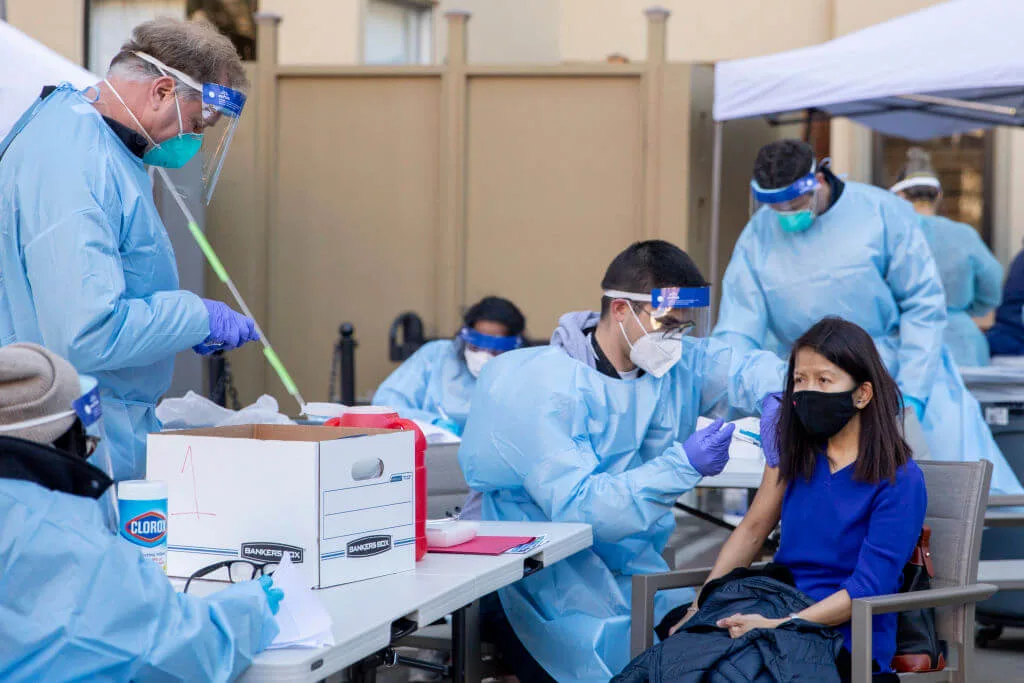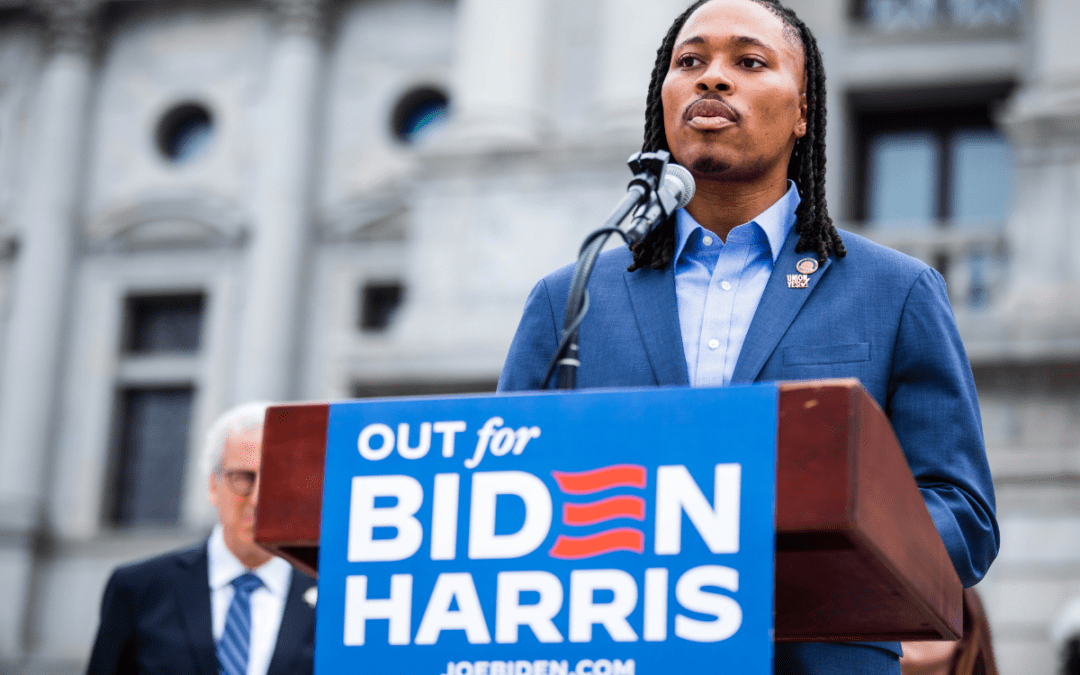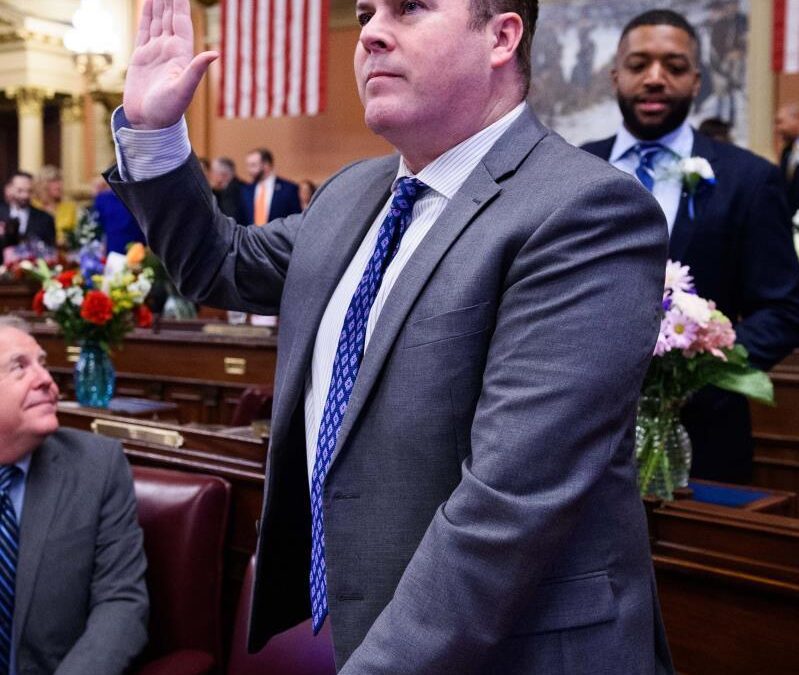
Marin Community Clinic staff and medics with Marin County Fire work at separate tables to prepare and administer the Pfizer COVID-19 vaccine in Greenbrae, California. (The San Francisco Chronicle Photo via Getty Images/Jessica Christian)
People fighting cancer are now eligible for priority COVID vaccination. But the benefit must be weighed against individual health status and doctor recommendations, experts say.
The US Centers for Disease Control and Prevention announced new guidelines this week that expanded access to COVID-19 vaccinations to people with comorbidities. For many with cancer, this was welcome news: They have a higher risk of developing a severe illness from COVID-19, and the virus is twice as fatal for them versus those who aren’t fighting the disease, according to the National Cancer Institute. Still, some cancer patients worry the vaccine could do them more harm than good. The answer is not clear-cut, and depends greatly on an individual’s health status and their doctor’s advice.
Initially, the CDC advised states to reserve the first round of vaccines for healthcare workers and those in residential facilities, such as nursing homes. But that plan created a bottleneck in inoculations as states set aside doses. In some cases, that slowed down distribution; in others it meant available supplies sat in storage or needed to be disposed of altogether. According to the CDC, about 29 million doses have been distributed to states, but so far only 10 million Americans have gotten a shot. The new guidelines now recommend states open vaccinations to anyone 65 and older, and anyone under 65 with a comorbid condition–such as cancer.
Cancer survivors and those in remission may get vaccinated provided they have no history of severe allergic reaction to any components of the drug. Unfortunately, there isn’t yet data on the vaccines’ safety and effectiveness when it comes to people who are currently fighting cancer. The most common cancer treatments deplete the body’s immune system while fighting the disease. For this very reason, initial COVID-19 vaccine trials excluded cancer patients. Traditional chemotherapy attacks fast-growing cancer cells as well as white blood cells, an essential part of the immune system. Patients undergoing bone marrow transplants temporarily lose all of their white blood cells, dramatically increasing the risk of serious infections. Radiation targets specific tissues with cancer, but can harm healthy adjacent structures in the process.
Both the Pfizer-BioNTech and Moderna vaccines use genetic code, called messenger RNA, that alerts the immune system to recognize and fight off the coronavirus. While patients may experience milder flu-like symptoms as a result, m-RNA vaccines do not contain any actual coronavirus. So patients fighting cancer have zero risk of contracting the coronavirus from the vaccine. There are other factors to consider, however.
“Although Covid is indeed an ongoing threat when patients are undergoing surgery, radiation, or chemotherapy, so is every virus or bacteria,” Austin-based cancer research fellow Russell Pawlawski told COURIER. “This is the danger of immunosuppression.”
This means that cancer patients who are already weakened could experience side effects from the vaccine that further debilitate them, increasing their odds of contracting other serious infections such as pneumonia. The American Cancer Society recommends against getting any vaccines while a person is undergoing chemotherapy or radiation treatments, because vaccines require a healthy immune system response to work. Due to some cancer patients’ impaired immune systems, the vaccines may not be as effective.
All this must be weighed against the risk of contracting the coronavirus itself. For the past week, the United States has averaged more than 3,000 deaths and 200,000 new infections from Covid-19 per day. The American Association for Cancer Research found that even when age and chronic illnesses were accounted for, cancer patients had a greater risk for severe COVID-19 disease and death.
“Some protection would be better than none,” Dr. Tracey L. Evans, director of thoracic oncology research at Lankenau Institute for Medical Research, told Philadelphia Inquirer. “I would just caution cancer patients getting the vaccine that immunity to the coronavirus may not be guaranteed, and we do need data on effectiveness.”
Vaccinated or not, the CDC recommends people in high-risk groups continue following safety guidelines to avoid contracting COVID, such as wearing masks, frequently washing hands and avoiding contact with others.
Politics

Malcolm Kenyatta makes history after winning primary for Pa. Auditor General
State Rep. Malcolm Kenyatta, who was first elected to the state House in 2018, won the Democratic nomination for Pa. Auditor General and will...

Biden administration bans noncompete clauses for workers
The Federal Trade Commission (FTC) voted on Tuesday to ban noncompete agreements—those pesky clauses that employers often force their workers to...

Philadelphia DA cancels arrest warrant for state Rep. Kevin Boyle on eve of Pa. primary
Philadelphia District Attorney Larry Krasner said a detective had sought the warrant against Boyle, a Democrat whose district includes a section of...
Local News

What do you know about Wawa? 7 fun facts about Pennsylvania’s beloved convenience store
Wawa has 60 years of Pennsylvania roots, and today the commonwealth’s largest private company has more than 1,000 locations along the east coast....

Conjoined twins from Berks County die at age 62
Conjoined twins Lori and George Schappell, who pursued separate careers, interests and relationships during lives that defied medical expectations,...





